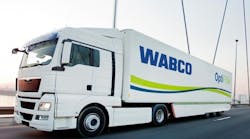German auto parts manufacturer ZF Friedrichshafen AG is acquiring WABCO Holdings Inc., a global supplier of technologies and services that improve the safety, efficiency and connectivity of commercial vehicles.
The deal will combine WABCO’s specialty in commercial vehicle safety systems — which includes technologies that can automatically slow or stop a vehicle — with ZF’s driveline and chassis technologies.
Under the agreement announced on Thursday, ZF will acquire all outstanding shares of WABCO for $136.50 per share in an all-cash transaction for an equity value of over $7 billion. The acquisition price represents a 13% premium to the closing stock price of $120.75 on Feb. 26, the date before media reports and WABCO’s confirmation that ZF had approached the company.
The acquisition is part of ZF’s Next Generation Mobility strategy and will expand the company’s expertise to include commercial vehicle braking solutions for the first time. This plays a central role for the control of automated driving functions – including emergency braking maneuvers of trucks and trailers.
Following the acquisition, customers of both companies will be able to have a fully integrated system approach, new drive systems for E-Mobility and autonomous driving functions. ZF expects that automated driving functions will primarily be implemented for commercial vehicles and in areas with low complexity and traffic – such as factory sites, at airports, and in agriculture. The combination of both businesses is expected to further accelerate the development of new technologies to enable autonomous commercial vehicle functions, making ZF less dependent on the economic cycle of the passenger car industry.
In a company statement, ZF added that the acquisition is consistent with its goal to develop and deliver technology solutions that make cars and commercial vehicles see, think and act in order to reduce emissions and increase road safety. While ZF already has sensor systems and computing technology for its “see“ and “think” competence, together with WABCO ZF will in future be completing the portfolio for commercial vehicle technologies to offer solutions to allow vehicles to “act”. ZF notes it is already a leading supplier in the area of steering and driveline technology.
“This is the right combination at the right price at the right time for WABCO,” said Jacques Esculier, chairman and CEO of WABCO. “We have a history of successful collaboration with ZF, including prototyping industry-first technologies, and the strategic fit between our two companies is compelling. After a thorough review, we are very pleased to announce a definitive agreement that we believe is in the best interest of WABCO shareholders.”
Wolf-Henning Scheider, CEO of ZF, said: “We believe that, together with WABCO, ZF can form the world’s leading integrated systems provider for commercial vehicle technology, creating long-term value and security for its customers, employees and owners.”
For ZF, the acquisition of a specialist in commercial vehicle braking systems “means adding a stable and growing business segment and enables our existing commercial vehicle division to expand its expertise in vehicle dynamics control,” Scheider added. “This will create the foundation for ZF to offer comprehensive systems for safe and automated mobility solutions for passengers and goods to our customers. This is also in the best interest of our owners, the Zeppelin Foundation and the Dr. Jürgen and Irmgard Ulderup Foundation, as the transaction will result in a sustainable strengthening of ZF.”
Esculier said he’s proud of WABCO’s track record since becoming a stand-alone public company nearly 12 years ago. He added that WABCO’s “early anticipation of industry dynamics and ongoing ability to innovate technology ahead of others are key contributors to our sustained differentiation and success. We are therefore highly attuned to long-range competitive forces and their potential implications as the sector contemplates a future of autonomous, electric and connected vehicles.”
Esculier said it has become apparent that the industry will face “a new level of strategic complexity” and will attract new competition, including new entrants from outside the sector that are able to bring resources to the table.
“Considering these factors, we strongly believe this is the appropriate moment to be joining forces with ZF, providing access to critical technology and the global size and scale to de-risk the return on investment required as the industry transforms. And as a result, it will realize certainty of value and liquidity for our shareholders,” Esculier said.
The transaction, which has been unanimously approved by WABCO’s Board of Directors, is expected to close in early 2020. It is subject to approval by WABCO’s shareholders, customary closing conditions, and regulatory approvals.




